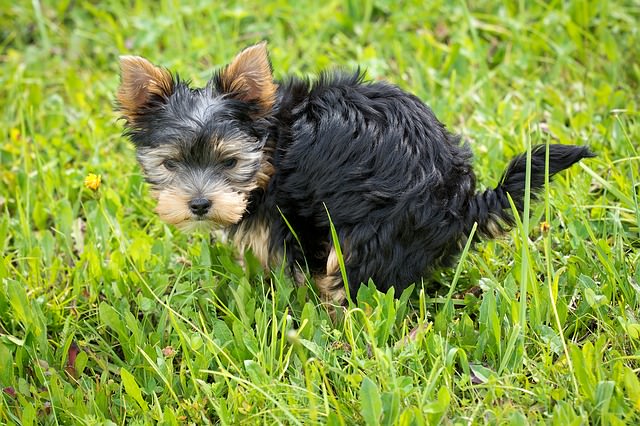Constipation in dogs is defined by the inability to pass normal stools. The stool itself can be hard and dry when it is passed and sometimes, dogs strain and are unable to produce stool at all. There are many reasons for constipation. To make a normal stool, a dog must be eating, have the ability to digest and concentrate the waste normally, have an open passageway for the stool to proceed through, have the muscle movement to push stool forward, and be able to posture normally for the bowel to evacuate.
1.Not Eating
The most common one I see is anorexia. People forget that to produce stool, one has to be eating normal amounts. When my patients are fasted for diagnostic testing or surgery, sometimes they will not have a normal and regular stool for a day or so immediately following the procedure. This type of constipation will resolve itself once the dog is eating normally again and the stool has time to form and pass.

2. Diet
Diet can influence the stool character. Some dogs need more fiber in their diets than others. Certain types of food choices can lead to constipation and it can be based an individual’s own digestion. You can try to see if your dog’s constipation is improved by changing her diet or adding plain (not spiced!) canned pumpkin pie filler to the diet as a source of fiber.
3. Tumor
There could be a tumor impeding the passage of stool, since constipation is most commonly seen in older dogs and they are also more prone to tumors. A dog with a fractured pelvis can suffer from constipation also.
4. Lack of Exercise
Dogs need exercise and movement to encourage normal movement in the bowel. If you think that your dog could be constipated, give him the opportunity to exercise outside and sometimes that is all that is required to start things going again.

5. Neurological Issues
Some neurologic issues can affect the colon and hinder its smooth muscle movement that is required to propel the fecal matter through the tract.
6. Physical Blockage
A dog’s intestinal function is sometimes not the cause of the trouble. Hair can get matted around the anus and block the passage of stool or a dog might have orthopedic pain from injury or osteoarthritis discouraging him from posturing to defecate. Sometimes the anal glands (small glands located on either side of the anus) will be painful and prevent the passage of the stool. Intact male dogs can have enlargement of the prostate gland that complicates normal defecation.
If you notice that your dog seems to not be passing normal bowel movements, make sure she is eating. You can try altering her diet with pumpkin or different brands of premium, high quality dog food options to see if the issue will resolve and make sure she is getting plenty of active play, but if the issue does not resolve in a day or two or your dog has any other symptoms, let your veterinarian know about the issue. Constipation could be a sign of something more serious going on and you will need professional medical help to find out.

